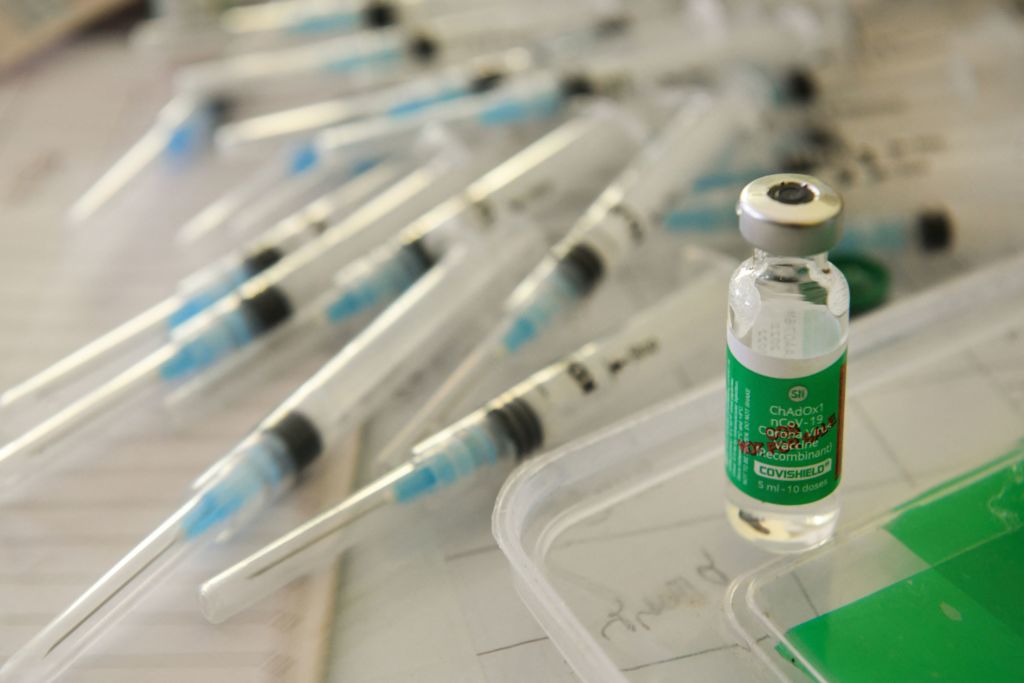- Sunday, April 20, 2025
As many as 1,749,417,978 doses of Covishield vaccine have been administered in India according to the vaccine dashboard of the government’s web portal CoWIN (till 10:30 pm on April 29, 2024).

By: indiaweekly.biz Staff
BRITISH-Swedish multinational pharmaceutical and biotechnology company, AstraZeneca for the first time admitted the possibility of its Covid-19 vaccine leading to a rare but serious side effect, namely the Thrombosis with Thrombocytopenia Syndrome (TTS), revealed a report of The Telegraph.
The covid-19 vaccine marketed worldwide under various names including Covishield and Vaxzevria, was administered in India in what was the world’s largest vaccination programme from January 2021. As many as 1,749,417,978 doses of Covishield vaccine have been administered in India according to the vaccine dashboard of the government’s web portal CoWIN (as of 10:30 pm April 29, 2024).
The vaccine administered in India by the name Covishield, was developed by AstraZeneca in association with Oxford University during the pandemic and was manufactured by the Serum Institute of India.
Read: COVID-19 ; WHO stops testing hydroxychloroquine on patients
Dr. Jayadevan, Co-Chairman of the National Indian Medical Association (IMA) Covid Task Force in Kerala, confirmed the revelation to ANI, “TTS, or thrombosis with thrombocytopenia syndrome, involves blood clots in the brain or other parts of the body, along with a low platelet count. It’s a rare occurrence following specific types of vaccines and other causes,”
“While Covid vaccines have undoubtedly saved lives, reports of these extremely rare but potentially serious immune-mediated events have also been documented in reputable journals,” he added.
Thrombosis with Thrombocytopenia Syndrome (TTS) causes blood clots (thrombosis) along with low levels of platelets (thrombocytopenia), crucial for blood clotting. Blood clotting in unusual locations such as the brain (cerebral venous sinus thrombosis) or abdomen has been noticed as one of its outcomes.
According to the report published by The Telegraph, this side effect is a rare yet serious one associated with only certain COVID-19 vaccines, notably adenovirus vector vaccines like AstraZeneca and Johnson & Johnson’s Janssen vaccine. Unlike mRNA vaccines, Covishield is based on the viral vector platform, utilizing a modified chimpanzee adenovirus to deliver the COVID-19 spike protein into human cells
Symptoms of the TTS syndrome may include severe or persistent headaches, shortness of breath blurred vision, persistent abdominal pain, leg swelling, chest pain, and easy bruising or tiny blood spots under the skin beyond the injection site.
Read: Pandemic keeps Uber in the red as revenue plunges
A report on yalemedicine.org published last year, highlighted the danger of blood clots, particularly when they develop within blood vessels, leading to thrombosis. Yale Medicine hematologist Robert Bona, MD, explained, “Those clots typically occur in individuals who are bedridden, hospitalized, or have other medical issues related to inflammation, infection, or cancer.”
Listing AstraZeneca COVID-19 ChAdOx-1 vaccine and the Johnson & Johnson (J&J) Janssen COVID-19 Ad26.COV2-S vaccines, the World Health Organization (WHO) reported in 2023 that TTS emerged as a new unfavourable event after individuals developed immunity against COVID-19 non-replicant adenovirus vector-based vaccines.
Interestingly enough, the vaccine was also made unavailable from Australian markets from March 21, 2023, to stop cases of TTS syndrome after the Australian Government received advice and recommendations from the Australian Technical Advisory Group on Immunisation (ATAGI) about the Vaxzevria (AstraZeneca) vaccine and its side effect in April 2021, reported Business Standard.